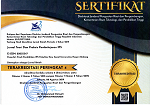Meningkatkan motivasi belajar siswa pada materi perdagangan internasional melalui model Make A Match di kelas IX C SMP Lab UM
Abstract
Motivation is identified as one of the important factors in constructing knowledge. This process is a vital part of constructivism learning. The purpose of this article is to examine the motivational strength of its application in Classroom Action Research (CAR). The results show that there is very little attention in motivation. In fact, if educators can increase motivation it will have an impact on the construction stage of knowledge in students. Therefore there are at least 3 components that need to be considered related to motivation in constructivism learning, namely: (1) learning challenges, (2) dual goals, and (3) class climate.
Keywords
Full Text:
PDFReferences
Aderman & Maehr, 1994. Motivation and schooling in the middle grades. Review of Educational Research, 64(2), pp. 287-309.
Ames, 1992. Classrooms: Goals, structures, and student motivation. Journal of Educational Psychology, 84(3), pp. 261-271.
Arikunto & Suhardjono, 2010. Penelitian tindakan. Yogyakarta: Aditya Media.
Arikunto, Suhardjono & SUpardi, 2012. Penelitian tindakan kelas. Jakarta: PT. Bumi Aksara.
Deci, Koestner & Ryan, 2001. Extrinsic rewards and intrinsic motivation in education: Reconsidered once again. Review of Educational Research, 71(1), pp. 1-27.
Eskasasnanda & Purnomo, A., 2018. Knowledge sharing motivation and benefits in Faculty of Social Sciences Lesson Study Community (KLS) Universitas Negeri Malang, Malang: Universitas Muhammadiyah Malang.
Green, 2002. Using an expectancy-value approach to examine teachers’ motivational strategies. Teaching and Teacher Education, 18(8), pp. 989-1005.
Harminingsih, 2015. Penerapan model make a match untuk meningkatkan motivasi dan hasil belajar Sosiologi materi dinamika kelompok sosial. Indonesian Journal of Education and Learning, 1(1), pp. 26-34.
Lepper & Drake, 1996. Intrinsic motivation and extrinsic rewards: A commentary on cameron and pierce's meta-analysis. Review of Educational Research, 66(1), pp. 5-32.
Pintrich & Schunk, 1996. Motivation in education: Theory, research and applications. Englewood Cliffs: Prentice Hall.
Stipek, 2002. Motivation to learn: Integrating theory and practice. 4th ed penyunt. Boston: Allyn and Bacon.
Sutarniyati, P., 2016. Peningkatan motivasi belajar siswa menggunakan model make a match pada pelajaran IPA kelas V, Yogyakarta: Universitas Negeri Yogyakarta.
Suwarsih, M., 2007. Langkah mudah penelitian tindakan kelas. Bandung: CV. Alfabeta.
Widyaningrum, I., 2015. Peningkatan motivasi belajar IPS menggunakan metode make a match pada siswa kelas Va Sd Negeri Golo Yogyakarta, Yogyakarta: Universitas Negeri Yogyakarta.
Wigfield & Eccles, 2000. Expectancy-value theory of achievement motivation. Contemporary Educational Psychology, 25(1), pp. 68-81.
Xiang, McBride & SOlomon, 2003. Motivational climates in ten teachers’ elementary physical education classes: An achievement goal theory approach. The Elementary School Journal, 104(1), pp. 71-92.
Refbacks
- There are currently no refbacks.
Editorial and Administration Office:
This Journal is published by Prodi Pendidikan IPS, Fakultas Ilmu Sosial, Universitas Negeri Malang
Semarang St. No. 5 Building I3-102 65145.
Phone. (0341) 551312. line. 376 (19)
Homepage: http://journal2.um.ac.id/index.php/jtppips/index
email: jtp2ips.journal@um.ac.id
JTP2IPS INDEXED BY:
e-ISSN 2503-5347
ISSN 2503-1201
JTP2IPS is licensed by CC BY 4.0.










